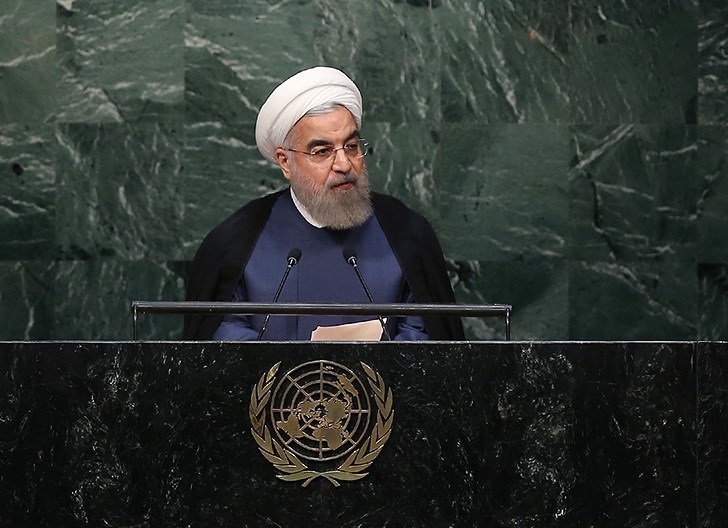by Daniel Amir
Iranian President Hassan Rouhani will address the UN General Assembly in New York on Wednesday. After some doubts were initially raised regarding his attendance, Rouhani finally boarded a flight. As he approached the aircraft with soldiers and members of his cabinet on either side, Rouhani was flanked by his First Vice President Eshaq Jahangiri and veteran foreign policy advisor to the Supreme Leader, Ali Akbar Velayati.
Jahangiri is one of Rouhani’s comrades-in-arms in the reform project. But Velayati, a close confidant of the Supreme Leader, served as a reminder to Rouhani that Iran’s president is never completely free to pursue his own agenda. He works instead within parameters outlined by and negotiated with the Supreme Leader. At the General Assembly, then, the president speaks not only in a personal capacity but as the Islamic Republic writ large. Casting a glance over past presidential speeches at general assemblies provides insight into what might be expected in Rouhani’s speech this time round.
Since the 1979 revolution and the overthrow of the Pahlavi regime, Iran has been keen to make it abundantly clear that its ideological orientation is independent, unique, and supremely moral. This is encapsulated most effectively in the revolutionary slogan na gharbi, na sharghi, jomhuri-ye eslami (neither Western nor Eastern: the Islamic Republic). Khamenei addressed this in one of his first speeches to the UN General Assembly during his stint as president in the 1980s. To his mind “there were several elements of our revolution that can be considered exceptions from the usual course of revolutions [in general].”
The Islamic Republic, as Rouhani is likely to say on Wednesday, is first and foremost a popular regime whose ideological dignity is not to be flouted. As Donald Trump bears down further on the nuclear deal and on Iran’s ballistic missile program, urging military site visits and increasing sanctions on Iranian organizations, Iran will increasingly focus on this message. Khamenei himself told the UN in the past, “We knew that for the sake of this belief and this path there would be a high price to pay; we have prepared ourselves.” Iran, he said, fears no sacrifice for the sake of its dignity.
Matters at the UN, however, do not always revolve around resistance or perseverance. Rouhani also has an opportunity to depict Iran as a wrongfully isolated nation, with much to offer the world—as an international and moral Islamic Republic. The tone of speeches has to satisfy criteria set out by Khamenei’s maxims above and still leave room for personal comment, as well as subtle signs of positivity. In his landmark speech to the UN in 1998 reformist President Mohammad Khatami (along with some veiled jibes at the US) presented an Iran ready to take part in a “Dialogue of Nations.” Khatami offered an Islamo-humanistic reading of history and suggested that, “instead of war and bloodshed and killing,” he said, “we can and must engage in dialogue with one another.”
Iran has repeatedly underlined its commitment to broadening its international relations and with the EU in particular—see the recent $5 billion deal with France’s Total—using such business deals to drive a wedge between an EU and a US already somewhat at odds in their approach to Iran. Rouhani will continue this line and elaborate on an ongoing commitment to a peace that will exclude America’s so-called imperialism and Iran’s own areas of influence in Syria. Khatami critiqued the post-Cold War “unipolarity” of international politics; it now falls to Rouhani and a more buoyant Iran to place itself as its own pole in the Middle East and Central Asia.
This was the precise thrust of Rouhani’s most recent speech at the General Assembly. His 2016 address was a combination of all of the above, pointing to the human dimensions on the fifteenth anniversary of the September 11th attacks but lamenting US and Saudi foreign policy in their aftermath. Rouhani echoed Iran’s commitment to peace and the “uprooting of violence from the region,” which no doubt also involved curbing the influence of those he felt were inspiring it. He added that the nuclear deal “brought with it important lessons on solving complex international issues.” Iran in 2016, said Rouhani, was ready for dialogue, though perhaps not to the degree that Khatami suggested almost 20 years earlier.
More than ever, Rouhani will try to cast Iran as a positive regional partner for the international community as US involvement and clout in Syria and Iraq wanes and its leadership grows ever less popular. Naturally, the viability of Iran as a regional partner for the EU should be carefully considered. Iran, after all, supports and aids Assad’s brutality, Yemen’s Houthis, and Iraq’s Popular Mobilization Units. Nevertheless, hawkish calls for leaving the Iran deal appear equally misguided. Under the current circumstances, such calls only play into the Iranian narrative oft repeated on the international stage since the revolution.
When Rouhani approaches the podium in New York on Wednesday—the first time in his second term—he will be flanked once more by the same two voices that accompanied him on the runway in Tehran: the reformist and conservative factions. In his speech, Rouhani will have to somehow satisfy both.
Daniel Amir is a graduate of Oxford University in Persian Studies and an MSc candidate in Conflict Studies at the London School of Economics. He has extensive experience in counter-terrorism and foreign policy research in Jerusalem, London, and Washington.





